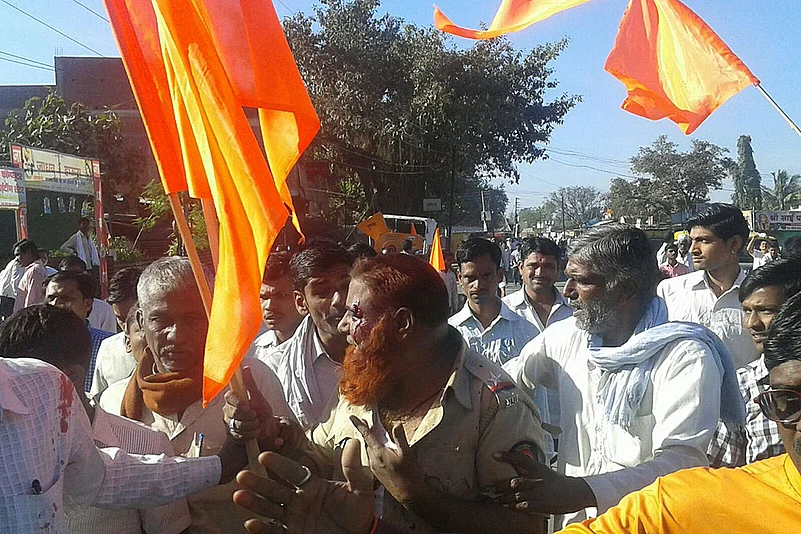In his speech in Bahraich in Uttar Pradesh on February 24, BJP president Amit Shah used JNU to recast the battle-lines between his party and all other political outfits after the current fashion. As he attacked Congress vice-president Rahul Gandhi for supporting students in JNU, Shah’s pitch was clear: ‘national’ versus ‘anti-national’. The drama over the campus protest to mark Afzal Guru’s hanging has become a handy tool for this ‘with-me-or-against-the-nation’ line, which accentuates the existing typology in even starker terms. BJP leaders, of course, call it an “India-versus-all” debate.
Shah, on a visit to UP to unveil the statue of Raja Suheldeo, a 11th century king of Shravasti, practically accused Gandhi of supporting forces that divide India. “If he does not support such slogans, he should dare to condemn them. The BJP condemns such slogans, our party will never support such acts.” The logic may be simplistic, even reductive—a party like the Congress can conceivably stand in solidarity with students against saffron bullying, and in favour of free speech and dissent generally, while not taking on board more ‘risky’ themes like Kashmir or Afzal Guru (who was after all hanged during the UPA years). But the BJP is taking it on with relish--if the JNU sloganeering was “anti-national”, it follows logically that all those who stood in solidarity with it are guilty by association.
That’s the message Shah chose to deliver from Uttar Pradesh. It’s also the line—neat and simple, and easy to digest—that partymen are supposed to take to the people when they go out campaigning. Party leaders told Outlook, “It’s a message whose time has come.” Shah’s speech in Bahraich in a way became a pointer to the political rhetoric the BJP will stick to in the days and months to come. A senior BJP leader in Delhi told Outlook, “The internal doubts we had are now all clear. This issue has come as a boon for us...it will be used as a device to sharpen the ideological war.” The plan of action then is simple and focused: portray the Congress as an “anti-national” party that shares ideological space with the Left.
A senior RSS leader loaned out to the BJP explains, “We’ll face the Congress with incontrovertible facts. We didn’t hang Afzal Guru, the Congress was in power when that happened. We didn’t hang Ajmal Kasab, again that happened when the Congress was in power. Rahul Gandhi has walked a long distance to be placed next to the Leftists in JNU. We will help him take that seat permanently.”
Will the ‘anti-national’ tag for Congress actually wash with the public? Says a BJP senior, “If the sloganeering in JNU had been anti-government or anti-Modi, it would have been different. What happened was anti-India. We’ll tell the people the Congress V-P who supports JNU students belongs to a party that doesn’t believe in saying Bharat mata ki jai.” In short, an old weapon deployed against the Left will now be extended to unsettle the grand old party, which otherwise occupies a centrist-naionalist space.
Evidently, such logic helps motivate the teeming cadres of the ABVP, the RSS-affiliated students organisation that was in the centre of the JNU episode, and before that in the Rohith Vemula affair, and now in a string of incidents around Indian universities. “ABVP and other pro-BJP college unions in the country have been strengthened,” says a senior leader. A win-win situation for the RSS-BJP. The RSS, so far not a little disheartened with its unattractive profile to the country’s youth outside of its own ranks, has found zealous nationalism as the perfect means to breach bastions like JNU and make new inroads elsewhere—especially in the mindspace of hitherto unaffiliated youth. With the ABVP galvanised, the RSS manages to attract youth to its ideology and gets a voice it has long been waiting for.
The BJP has ascertained its own gains. For one, the ongoing nationalism debate works as a huge distraction for critics of the government who would rather focus on non-performance. By upping the atmospheric pressure around its favoured themes, the PM and his team, struggling to salvage a tanking economy and its own image owing to the paucity of real progress in the last two years, can buy time to mend perceptions. Not just that mandating conformism around emotive topics will help the BJP overcome internal issues, its own inept handling of party and government over the last 21 months.
RSS veterans deny that JNU was part of any grand plan. A former ideologue told Outlook, “For long, the Congress and its cohorts have presented RSS’s nationalism as communalism. Now is the time to debate that perception. It is also time to debate loyalty issues, secularism in the name of Hindu-bashing and the easy recourse to slogans against communalism.”
A BJP leader adds, “Our feedback says there is a glamour around nationalism and this is the right time to consolidate people against the Congress.” Saffron seniors are taking most pride in the fact that “common people now consider as mainstream what was once ridiculed as the lunatic fringe”. It’s the “beginning of the Hindu rashtra’s reassertion,” says an RSS ideologue. “The pendulum is swinging back into normal position.” Is it, really?
By Prarthna Gahilote in Mumbai


























